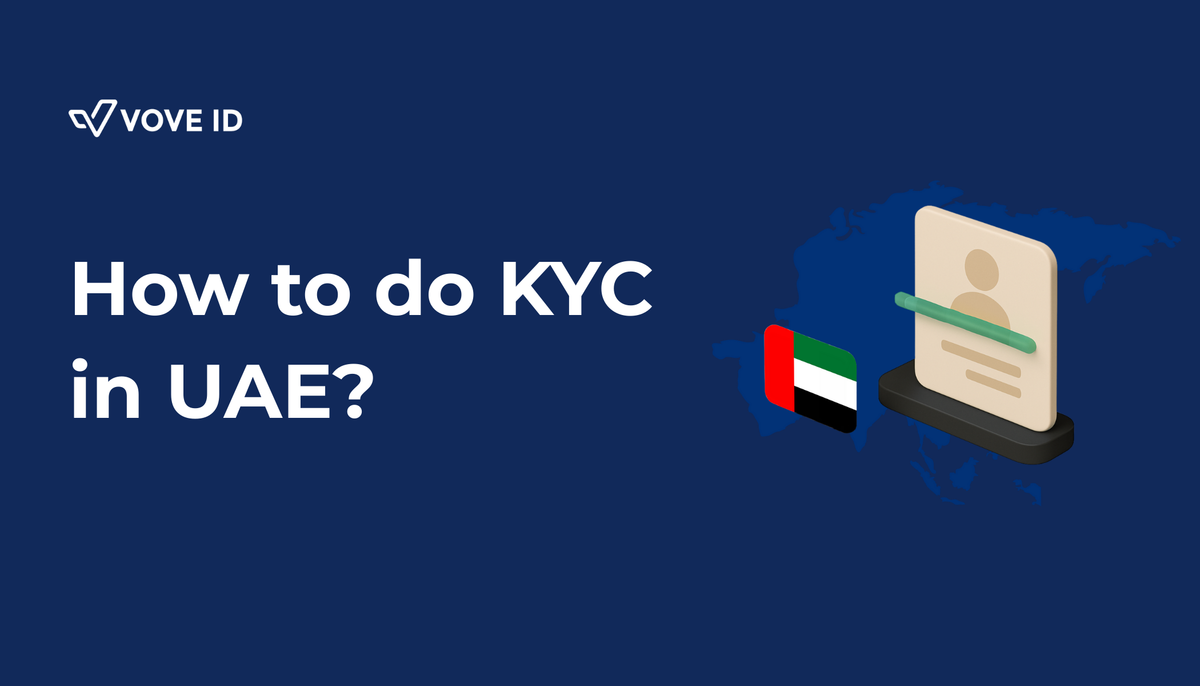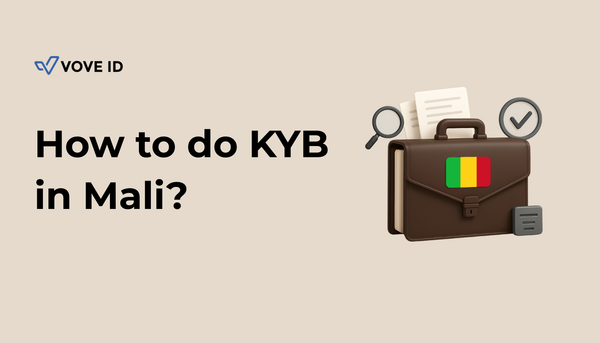Know Your Customer (KYC) in the UAE: A Comprehensive Guide
Discover KYC compliance in the UAE with our 2025 guide. Learn about UAE KYC laws, verification processes, and digital solutions like VOVE ID to ensure compliance and prevent financial crime.

Introduction
Know Your Customer (KYC) is a critical process that enables businesses to verify their clients’ identities and safeguard against financial crimes such as money laundering and terrorist financing. In the United Arab Emirates (UAE), KYC compliance is central to maintaining a secure and transparent financial ecosystem. This guide explores KYC requirements, the legal framework, the verification process, and updates to UAE KYC laws for 2025, providing practical insights for businesses striving for compliance.
What is KYC?
KYC is the process businesses use to confirm their customers’ identities and understand their financial activities. It fosters trust, ensures regulatory compliance, and helps prevent illicit activity at its earliest stages. By collecting and verifying customer information, assessing risk, and monitoring transactions, KYC strengthens the financial system. In the UAE, KYC compliance is mandatory for banks, financial institutions, and specific non-financial sectors, such as real estate and precious metals trading, ensuring robust identity verification in the UAE.
Who Needs to Comply with KYC in the UAE?
KYC compliance in the UAE applies to a broad range of entities to protect the financial system. Businesses required to implement KYC include:
- Banks and Financial Institutions: Banks, exchange houses, and insurance companies must verify customer identities.
- Designated Non-Financial Businesses and Professions (DNFBPs): Real estate agencies, law firms, accounting firms, and company service providers.
- Precious Metal and Gemstone Traders: Dealers in gold, diamonds, and high-value goods.
- Virtual Asset Service Providers (VASPs): Cryptocurrency exchanges and virtual asset platforms.
- Other High-Risk Sectors: Businesses in luxury goods or high-value art may also need KYC, depending on their activities.
Non-compliance with UAE KYC laws can lead to severe penalties, including fines of up to AED 5 million for KYC and AML breaches, as enforced by the UAE Central Bank in recent years, or reputational damage.
Legal Framework for KYC in the UAE
To combat financial crime, the UAE has established a robust legal framework for KYC compliance, aligned with international standards set by the Financial Action Task Force (FATF). Key regulations include:
- Federal Decree-Law No. 20 of 2018 on Anti-Money Laundering and Combating the Financing of Terrorism: Requires businesses to verify identities, conduct due diligence, and report suspicious transactions to the Financial Intelligence Unit (FIU).
- Cabinet Decision No. 10 of 2019: Details KYC procedures, including customer identification and risk assessment.
- Central Bank of the UAE (CBUAE) Guidelines: Mandates enhanced due diligence (EDD) for high-risk clients, such as politically exposed persons (PEPs).
- Economic Substance Regulations (ESR): Supports KYC by ensuring businesses have legitimate operations.
- Ministry of Economy Oversight: Ensures DNFBPs implement KYC to meet AML/CFT standards.
Free zones like the Dubai International Financial Centre (DIFC) and Abu Dhabi Global Market (ADGM) enforce their own KYC regulations, aligned with federal laws, to support identity verification in UAE’s financial hubs.
KYC Verification Process in the UAE
The KYC process in the UAE is thorough yet efficient, enabling businesses to verify identities while maintaining smooth operations. The steps include:
- Customer Identification:
- Collect details like full name, date of birth, nationality, and address.
- Gather documents such as Emirates ID, passport, or trade license (for businesses).
- Emirates ID is essential for residents, linking to the UAE’s national identity system.
- Document Verification:
- Authenticate documents using government databases or digital KYC solutions.
- Ensure documents are current to prevent issues like account freezes due to expired IDs.
- Risk Assessment:
- Evaluate risk based on occupation, source of funds, or country of origin.
- Apply enhanced due diligence for high-risk clients, such as PEPs or those from high-risk jurisdictions.
- Ongoing Monitoring:
- Monitor transactions for unusual patterns, such as large or irregular transfers.
- Update customer records regularly to comply with UAE KYC laws in 2025.
- Reporting:
- Report suspicious transactions to the FIU via the goAML platform, as required by the CBUAE.
Digital tools like UAE Pass, a secure digital identity platform, streamline identity verification in the UAE, enhancing KYC compliance efficiency.
Recent Developments in KYC Compliance
The UAE continues to innovate in KYC compliance. In 2023, the government launched the National KYC Platform, as reported by the Emirates News Agency (WAM). This platform:
- Centralizes KYC data to improve efficiency and reduce duplication.
- Enhances collaboration between government, financial institutions, and free zones.
- Leverages technologies like blockchain to strengthen AML/CFT compliance.
Recent Gulf News posts on X (formerly Twitter, May 2025) emphasize the need to update Emirates ID for KYC compliance, warning that banks may freeze accounts if details are outdated. These efforts reflect the UAE’s commitment to digital KYC solutions and accurate customer data.
Challenges and Best Practices
Despite a strong framework, businesses face challenges in KYC compliance, including:
- Regulatory Complexity: Navigating federal and free zone rules can be challenging for small and medium-sized enterprises (SMEs).
- Compliance Costs: Investing in digital KYC solutions and training can strain resources.
- Data Privacy: Balancing KYC with the UAE’s Personal Data Protection Law requires careful management.
Best practices to address these challenges include:
- Adopt Digital KYC Solutions: e-KYC platforms automate verification, reducing costs and time.
- Train Staff Regularly: Ensure teams are updated on UAE KYC laws for 2025 and AML/CFT requirements.
- Engage with Regulators: Stay informed through the CBUAE and free zone authorities.
- Conduct Audits: Regularly review KYC processes to identify and address gaps.
How VOVE ID Can Help
At VOVE ID, we simplify KYC compliance in the UAE with tailored e-KYC solutions that meet federal and free zone requirements. Our platform offers automated ID verification, risk assessment, and ongoing monitoring, helping banks, real estate agencies, and VASPs stay compliant efficiently. Learn more at our site!
Conclusion
KYC is vital for maintaining the UAE’s secure and trustworthy financial system. With a robust legal framework, innovative tools like the National KYC Platform, and digital KYC solutions, the UAE sets a global standard for compliance. Businesses must prioritize KYC to avoid penalties, protect their reputation, and succeed in the UAE’s dynamic market. By adopting best practices and leveraging platforms like VOVE ID, companies can navigate UAE KYC laws in 2025 with confidence.




